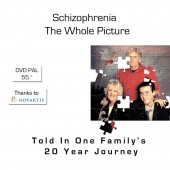Across Any Border: Schizophrenia and the International Family
Apologies to my readers, new and old, for not having blogged for a few weeks. I was in London last month participating in an international conference on schizophrenia recovery, and lots of energy went into that experience.
The conference organizers had read Ben Behind His Voices, and so I was asked to share my experience as family caregiver (or, in UK_speak, "carer").
As you might imagine, I learned a lot more than I shared. The main lesson, reinforced:
When a loved one develops schizophrenia, feelings have no country borders. We do not stop loving when mental illness moves in. We do share feelings of grief, anger, confusion, determination, resentment, loss, helplessness, and more.
I connected first with Georgina Wakefield, my UK counterpart in many ways.
[caption id="attachment_1575" align="alignleft" width="170"] Georgina Wakefield and Family try to Piece the Puzzle Together[/caption]
Georgina Wakefield and Family try to Piece the Puzzle Together[/caption]
Georgie is mother and carer for her son Christian, and like me has become a powerful family mental health advocate. Her book, Loving Christian, is a strong force for empathy and change in the UK.
I also had the privilege of connecting with non-family caregivers, professional and personal, from places like Italy, France, the Netherlands, Scandinavia and more.
Sure, there are some differences in roles, in systems, in languages, in treatment options - but so much of the emotional journey applies anywhere.
Some things that struck me, or touched me, at this conference:
- In contemporary movies, 83% of characters with schizophrenia are dangerous or violent.
- Psychiatrists and mental health nurses experience stigma and isolation of their own, due to the field they have chosen.
- The list of nursing allowed duties varies from country to country. Who makes home visits? That varies as well.
- 25-50% of schizophrenia placements post-treatment are with families as caregivers.
- Many embrace the status quo rather than "risk" new ideas for treatment.
My take on much of this? A reinforcement of the message that is a big part of my book and my speaking engagements:
Families are a vital part of the mental illness and mental health experience. Most of us hope for, work for, try to plan for eventual independence for our loved ones living with mental illness - but in the meantime we are often called into service to keep recovery active, consistent, and to watch for the bumps in the road.
For that, we need support and education as early in the process as possible, and opportunities to connect and keep learning as new information becomes available. We need respect, access to information, and the hope that comes with new research and development. Without this, we can make things worse. With it, we can help.
What is the system like where you live?
APA Reference
Kaye, R.
(2013, September 12). Across Any Border: Schizophrenia and the International Family, HealthyPlace. Retrieved
on 2026, March 4 from https://www.healthyplace.com/blogs/mentalillnessinthefamily/2013/09/across-any-border-schizophrenia-and-the-international-family